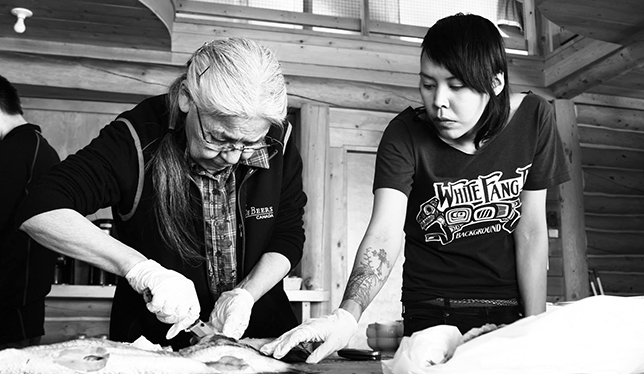School was a struggle for Kristen Tanche – until she found the one that fit. After Grade 11, she took online courses to try and complete high school. But the solitary learning style didn’t suit her. She then enrolled at the University of Northern British Columbia, focusing on First Nations environmental planning, but the campus was far from her home and family in Fort Simpson, Northwest Territories. After a year and a half, she dropped the program.
“I really wanted to learn more about my region,” said Ms. Tanche, now 31, who grew up in the NWT and whose mother is Dene. “I was starting to learn a lot about other Indigenous people [at UNBC], but I’m a strong believer that you really need to get to know where you’re originally from.”
When she spotted posters for the Dechinta Centre for Research and Learning around town and on social media, and learned that many of its professors were from the North, she decided to enrol.
“It was really scary at first,” she said. “I thought, ‘What am I getting myself into? I’m going to be in the bush and away from all my family for five to six weeks.’” But she quickly found herself mastering skills she’d hardly dreamed of, from living on the land to studying regional politics and acing academic essays.
Dechinta, also known as Dechinta Bush University, is far from the bricks-and-mortar model of most universities around the world. Though its pronunciation is variable, Dechinta means “being in the bush” in all Dene languages. The Northwest Territories-based institution, established in 2009, offers postsecondary-level courses relevant to northern students, with topics ranging from indigenous medicine to natural resources management.
Its current campus is a lakeside tourism lodge 100 kilometres from Yellowknife. Students spend their time on the land learning a range of skills, including camping out in canvas tents, chopping firewood, snaring fish and tanning moosehides, from elders and community experts. At the same time, they work with Indigenous professors to enhance their academic research and writing skills.
Currently, the school partners with the University of Saskatchewan, the University of Alberta, the University of British Columbia and McGill University to offer credited undergraduate and master’s-level courses. Dechinta’s partnership with UBC, set in motion in 2015, allows Glen Coulthard, an associate professor who teaches First Nations studies and political science, to split his time between UBC and Dechinta. It’s a model Dechinta staff hope to replicate with other universities across the country.
land-based approach is key to success
To Erin Freeland Ballantyne, Dechinta’s dean of land-based academics, research and innovation, the curriculum’s land-based approach is key to the institution’s success. Like many northerners, Dr. Freeland Ballantyne had to leave home to pursue a postsecondary education – a bachelor’s degree at McGill University, and an MSc and PhD at Oxford University. Having been born and raised in Yellowknife, she wanted to give her fellow northerners the opportunity to learn in their home territory, from their home territory.
So far, it’s working: In its seven-year existence, every one of its 340-plus students has completed the program they enrolled in. Considering the school operates in a territory that has a 66 percent high school graduation rate, the second lowest in the country, it’s a remarkable achievement.
Students have ranged in age from 18 to 68, from recent high school graduates like Ms. Tanche, unable or unwilling to attend postsecondary school farther south, to residential school survivors taking a second chance at their education. And since Dechinta accommodates young parents, the centre includes KidsU, a children’s program that runs alongside the official curriculum. Sometimes, the younger students join in the adults’ activities, learning to collect medicines, set fish nets, snare rabbits and hunt.
But Dechinta is still not a full-fledged university. Since establishing the school, staff, alumni and NWT community members have been lobbying their territorial government for core funding that would allow the institute to deliver full, degree-granting programs. In the past year, Alfred Moses, the Northwest Territories minister of education, culture and employment, promised to work with Dechinta to achieve that goal. Dr. Freeland Ballantyne hopes to see students graduate with joint Dechinta-UBC and Dechinta-U of A degrees by 2019.

But she also has more specific plans in mind. She hopes to open branches of Dechinta in each region of the Northwest Territories, teaching courses specific to each region’s environment, culture, language and history. If Dechinta meets its goal of launching a four-year undergraduate program, it will include semesters at a circumpolar university as well as indigenous studies programs at other international locations. Universities in Hawaii and Norway have already expressed interest.
For now, Dechinta’s two full-time employees are working on introducing and expanding individual courses. Last year, Dechinta launched the Indigenous Boreal Guardians Program, a series of courses over two years that helps students develop the skills to work with government and industry in protecting lands and managing natural resources.
“I love being out here on the land”
Ms. Tanche returned to Dechinta in the summer of 2015 to participate in the pilot semester of the Indigenous Boreal Guardians Program. And she’s not done with her education. Since her first stint at Dechinta in 2012, she’s become more active in Fort Simpson, participating in various committees for the Liidlii Ku’e First Nation Band, and acting as a local representative in the regional tourism board. In her spare time, she’s learning how to sew, to speak South Slavey and tan moosehides. This fall, she planned to enrol in a social work program at Aurora College and hopes to one day find work in land-based counselling programs.
“Doing the Dechinta program, I realized I love being out here on the land. This is where I’m happiest. This is where I’m healthiest. This is where I’m immersed in the culture and still learning,” she said. “If you can make that your job, that’d be winning.”